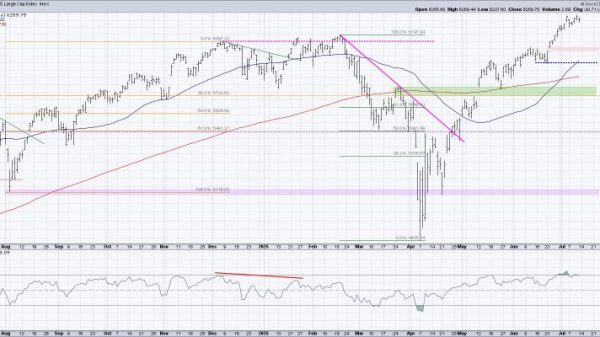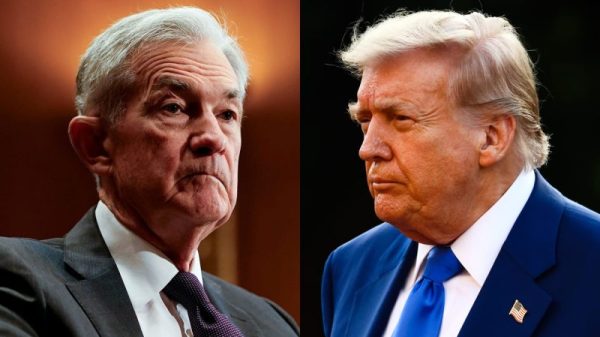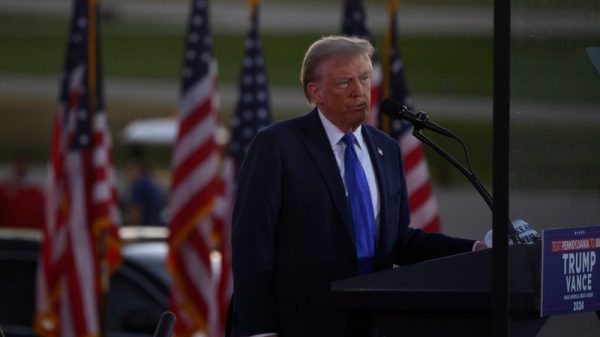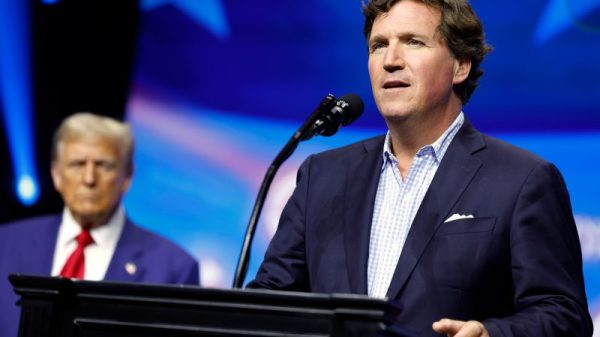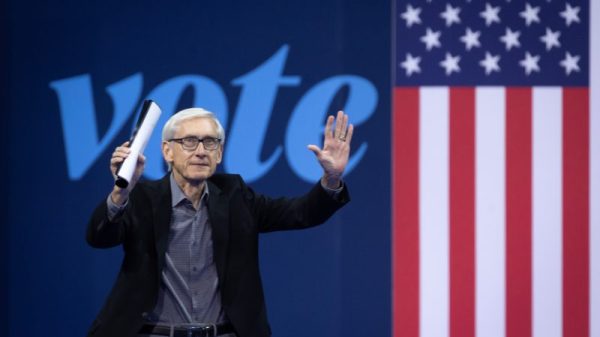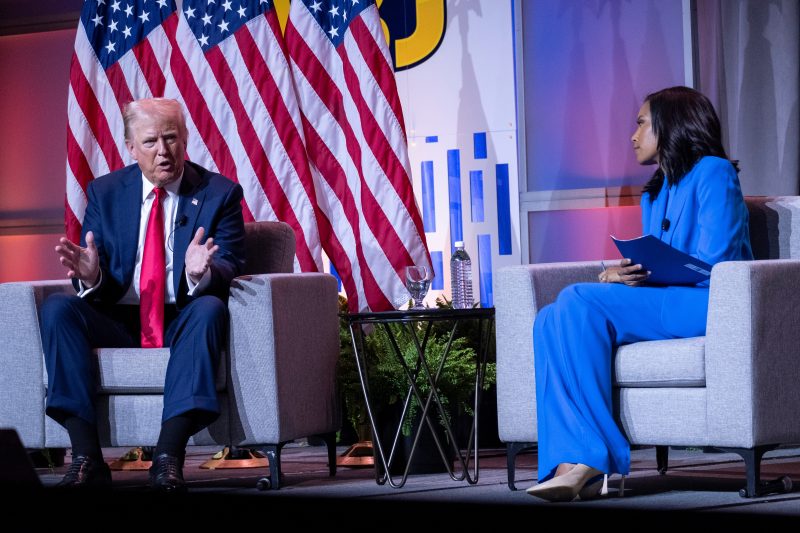For weeks, Senate Republicans delighted in the misery of their Democratic counterparts. The political story of the summer — whether President Biden would back down from his run at a second term — left GOP senators smiling and away from the media’s glaring spotlight on their foibles.
But the tables quickly turned. Their party’s presidential nominee recently returned to his natural form and lashed out against Vice President Harris in divisive terms that had little basis in truth. Republicans went right back into the political PTSD of the Donald Trump era, mouthing the same platitudes that they grasped onto during his presidency.
“He needs to focus on the policies of the Biden-Harris administration,” Sen. Shelley Moore Capito (R-W.Va.) told reporters Thursday morning.
Was she comfortable with Trump’s rhetoric? “He needs to focus on the Biden-Harris policies. That’s the successful pathway to November,” Capito said.
If that’s the path to success, why does Trump instead dive right into attacks on race instead of policy?
Capito let out a roaring laugh that lasted six whole seconds, incapable of answering the question — or unwilling to share her honest answer.
“I’m a really good mother and grandmother. I can’t answer that one,” she said.
Senate Republicans have always had the strangest relationship with Trump. The traditional Reagan-Bush ethos remains strong in their caucus even as the populist, nativist elements have come to dominate the House Republicans.
Republicans remember how Trump’s grievance-filled stumping for their two candidates who lost in the early 2021 Georgia runoff elections handed control of the Senate to Democrats. Many blamed Trump for inciting the Capitol riot — although just seven voted to convict him in the February 2021 impeachment trial.
After growing tired of constantly responding to his crazy tweets or wild statements during his time in the Oval Office, Senate Republicans were reluctant to endorse Trump’s campaign last year.
Yet, as Trump marched through the GOP primaries without any serious competition, and as voters soured on Biden amid questions about his capacity to serve, Senate Republicans embraced what they considered to be a certain victor, especially since he led them to believe that he was a different candidate.
They particularly embraced Trump’s call for “unity” after the July 13 attempt on his life in Butler, Pa., which some pundits declared to be the end of any Democratic chances of success.
“I hope that one good thing that comes out of this tragedy is a renewed sense of what unites us, a renewed respect for our fellow Americans,” Sen. John Thune (R-S.D.), who previously clashed with Trump, wrote in a July 19 op-ed distributed in his state.
The accommodations came before then. When Trump met at the Senate GOP political headquarters in June, he twice shook hands with Minority Leader Mitch McConnell (R-Ky.), who went 3½ years without speaking to Trump after the 2020 elections.
“Tremendous unity,” Trump said after that meeting.
Later that day the ex-president even publicly backed one of his harshest Republican critics, former Maryland governor Larry Hogan, in his Senate race.
After Harris locked up the support to replace Biden on the top of the ticket, House and Senate GOP leaders even cautioned their rank-and-file to drop any mentions of Harris as a “DEI” candidate. Trump wanted to focus on policy issues such as inflation and border security.
By 3 p.m. Wednesday, all those hopes for a unity-and-policy-centric campaign came undone.
Trump had just used his appearance at the National Association of Black Journalists conference to falsely question whether Harris hid her Black identity and accuse her of being only Indian. He mocked a prominent journalist as “that woman” and again praised the insurrectionists serving prison time for attacking the Capitol on Jan. 6, 2021. He continued to tout those claims in a rally that same evening.
A couple of reporters followed Thune down a hallway before one politely told him to stop, that he was going to get a ton of questions about these comments. He read Thune the verbatim of Trump’s most incendiary remarks.
“Um, the campaign is — needs to be — mostly about the issues. There’s plenty to talk about, and I just think that’s where the focus needs to be,” Thune said, never addressing the substance of Trump’s assertions.
In the flip of a switch, Republicans were back on defense, reassuming the same roles they had been playing in years past.
A very small bloc tried to defend or explain the comments. “I mean, he’s going to say what he’s going to say,” Sen. Tommy Tuberville (R-Ala.) said Wednesday evening, acknowledging he had not watched the comments.
“He knows it’s all about policy,” Tuberville said, suggesting that it must have been a leading question that prompted the remarks. “It is what it is.”
Some Republicans took the duck-and-dive approach, making a very brief critique of an obviously outlandish statement.
“I don’t think it was helpful,” Sen. Roger Wicker (R-Miss.) said, swiftly jumping on an elevator to whisk him away from the Capitol press corps.
Only a few Senate Republicans forcefully criticized Trump, along with the incendiary statements that have resurfaced from his running mate, Sen. JD Vance (R-Ohio).
“Think about it,” Sen. Lisa Murkowski (R-Alaska) told reporters Wednesday. “What have we been talking about all week long? Childless cat women, DEI candidates. Now, is she Black? Is she Indian?”
Murkowski is one of only four Senate Republicans to say publicly that they will not vote for Trump, so she has more political freedom to offer her unvarnished thoughts. She recalled how Trump had previously — falsely — questioned whether Barack Obama was a citizen. She questioned if his campaign is capable of carrying on in a normal fashion.
“Maybe they don’t know how to handle the campaign. And so you default to issues that just should simply not be an issue,” she said.
Most Senate Republicans jumped onto the same rhetorical life raft: Avoid addressing the actual Trump comments and instead wish for a return to the seemingly disciplined, policy-focused candidate of early summer.
“I’d say the policies are the key issues that we need to be talking about,” Sen. James Lankford (R-Okla.) told reporters Thursday morning.
Lankford’s most recent policy foray would be a keen illustration of Trump’s aversion to substance. Lankford spent months negotiating a border-immigration compromise with Senate Democrats, and just as it was coming together, Trump demanded Republicans torpedo the Lankford bill because he wanted to keep the issue alive to use against Democrats in the November election.
Will Trump’s rhetoric would hurt Republicans in November? “I think we’ll know more once the election happens,” Lankford said.
Sen. Steve Daines (R-Mont.), chair of the National Republican Senatorial Committee, has about as strong a relationship with Trump and his family as any GOP senator. He’s worked closely with the ex-president in recruiting candidates and securing endorsements at the right time to get the best candidates through their primaries and into the general election for the Senate.
He had not heard Trump’s comments by Wednesday evening, when a pack of reporters trailed him, so he stopped and listened to a summary.
“I don’t think it’s that difficult to litigate this race. This is the most liberal candidate for president that we’ve had in our nation’s history. I served with Kamala for four years,” Daines responded.
He blasted her “San Francisco politics and ideology” and said Republicans should focus on contrasting “the two visions of where we’d like to take this country.”
“That’s a better strategy, and that’s what I’ve been talking about,” Daines said.
But it’s not what Trump enjoys talking about. Republicans learned — relearned — this lesson again from the NABJ appearance.
Trump likes to talk about the border crisis, but his solutions are the simplistic answers of finishing the wall or the impractical idea of creating mass deportation camps for millions of undocumented migrants.
In selecting his running mate, Trump considered several Senate Republicans with real policy expertise in cutting taxes and national security. Some accomplished governors received interest.
Then he settled on Vance, the least experienced GOP running mate since before World War II. Vance’s biggest credential, his friends said, was his embrace of Trump’s political persona.
By Thursday morning, Murkowski had grown more furious.
“A campaign built on insults of an individual — we should be so far beyond that,” she told reporters. “It should not be about which nasty name you can call somebody. It should be about the issues.”








